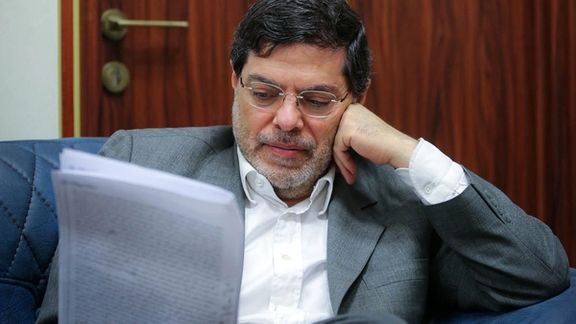Iranian Official Says 'Guarantees' Needed For A Nuclear Deal With US

A member of Iran’s nuclear negotiating team says removing the terrorist designation of its Revolutionary Guard is not enough and Tehran wants other guarantees.

A member of Iran’s nuclear negotiating team says removing the terrorist designation of its Revolutionary Guard is not enough and Tehran wants other guarantees.
Mohammad Marandi, introduced in Iranian media as an “advisor” to its negotiating team, said in Tehran, “Even if America at this moment completely removes the Guards [IRGC] from the terrorism list, the current situation will not change and we would not be able to speak of an agreement, because there are still a few problems remaining, the most fundamental of which is a guarantee by the US over its possible obligations.”
The statement clearly reintroduced past Iranian demands that the United States would not withdraw from a new deal or impose future sanctions in the future. The Biden administration and others have said that the President constitutionally cannot provide such guarantees, as a future administration can act according to its own policies.
Iranian officials and politicians have tried to downplay the issue of removing the IRGC from the US list of terrorist organizations as the main hindrance to reaching an agreement. Marandi’s statement is a more direct manifestation of this approach, given the fact that he has acted as a media advisor to Tehran’s negotiating team.
Whether the emphasis on securing guarantees is an attempt to deflect popular resentment in Iran against the IRGC as the reason for the lack of an agreement, or it is a genuine shift in Tehran’s position in the talks, is difficult to say.
Marandi presented a realistic picture of the Biden administration’s precarious domestic situation in garnering support for reviving the 2015 nuclear agreement, JCPOA. He said there is considerable Congressional opposition to what opponents say are too many US concessions during the Vienna negotiations since April 2021.
But he presented an interpretation of the diplomatic situation that recently officials and media in Tehran have advanced. In the wake of Russia’s invasion of Ukraine, the West, especially Europe need Iran’s oil and natural gas and that puts pressure on them to make a deal.
The problem with this reasoning is that without full normalization of relations with the West, Iran’s capacity to supply significant amounts of oil, and especially gas, is very limited. A nuclear agreement would not be sufficient to unlock full Western financial and technological investments needed to boost Iran’s oil and gas production to a significant level. Iran has shortages of gas even for its domestic consumption and its oil minister Javad Owji has said that at least $160 billion is needed to revitalize oil and gas production.
Full normalization of relations means that Iran should drastically retreat from its aggressive regional policies amounting to an attempt to build a Shiite “empire” extending to the Mediterranean. However, Tehran calls its regional policy its “red line.”
Marandi in his interview explicitly brought up the issue of investments. “If there is no guarantee for foreign investments, no company will dare toenter the Iranian market to invest and this would clearly impact our economic interests.”
In other words, Iran wants full economic benefits just for a cap on its nuclear program. Given the secret nature of the Venna talks, it is not clear if the cap would be permanently preventing Iran from expanding its nuclear capabilities or would follow the original JCPOA sunset clauses.
Marandi insisted that the IRGC’s delisting issue is an excuse by the West not to give economic guarantees. In other words Iran’s position of receiving every concession but not negotiating over its regional policies would amount to “having your cake and eating it too.”